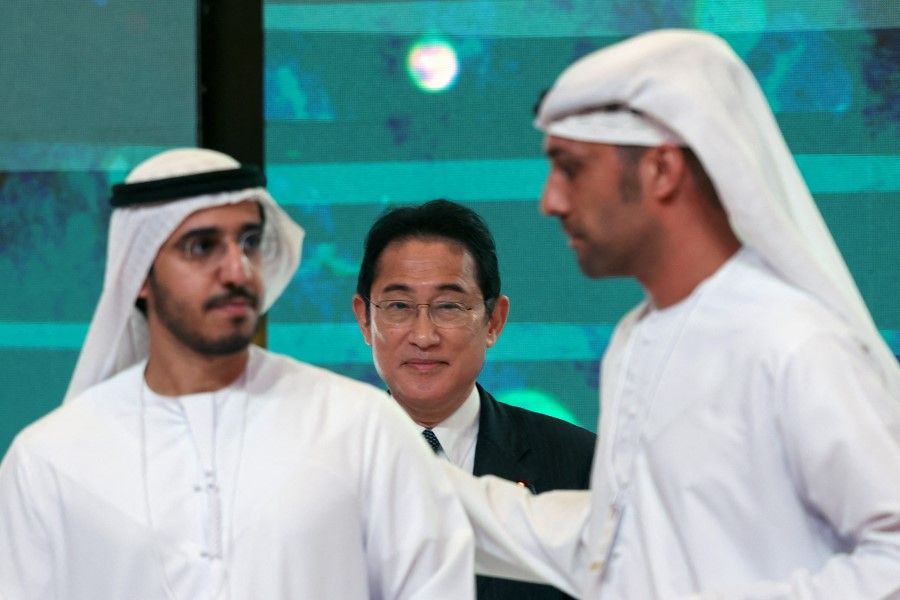Asserting Japan's interests in the Middle East
Japanese academic Masaaki Yatsuzuka notes that Japan's Middle East diplomatic initiatives pit it against China, which is also attempting to increase its influence among the Arab nations. How will developments pan out, and what does the future hold for Japan-Middle East relations?

Japanese Prime Minister Fumio Kishida visited Saudi Arabia, the UAE and Qatar in mid-July 2023, marking the first visit by a Japanese prime minister in three and a half years, during which the international order changed considerably with the Covid-19 pandemic and Russia's invasion of Ukraine. Unsurprisingly, Kishida's visit to the Middle East marked new directions for relationship-building in light of these changes.
Sustainable economic development
First, there is a shift towards future-oriented relations. The Arab Gulf states are of paramount importance to Japan in terms of energy security. Regional stability in the Middle East is essential for a stable supply of crude oil, so Japan continues to have a strong interest in the stability of this area.
At the same time, what stood out about this visit was that it reflected a policy of building sustainable relations as well as immediate stability. Kishida's visit was accompanied by a Japanese business mission delegation, promoting economic cooperation not only in energy but also in a wide range of other fields, including advanced science and technology, medicine, healthcare, and environmental technology. Japan wants to get more involved in the economic development of Arab Gulf states, hoping to build strong economic relations towards a future decarbonised society by supporting industrial diversification.
... the emerging countries of the Middle East are important to maintaining a stable international order, and Japan expects them to be partners in this respect.
Collaboration amid differences
Second, there is collaboration on global issues. When meeting with the leaders of the Arab Gulf states, they discussed not only regional affairs but also global issues. The Middle Eastern countries and Japan have their differing views on the international order, as evident in the responses to the war in Ukraine. Japan criticised Russia's aggression and participated in economic sanctions against Russia, but the countries of the Middle East have not participated in the economic sanctions and maintain their own positions.

The media release of the recent summit did not criticise Russia by name, but given their rising influence, the emerging countries of the Middle East are important to maintaining a stable international order, and Japan expects them to be partners in this respect.
The importance of collaboration between developed and emerging countries was confirmed at the G7 Hiroshima Summit in May this year. Cooperation with the Arab Gulf states in areas such as mineral resource supply and new energy is likewise seen as promoting de-risking, and alleviating an excessive economic dependence, as agreed at the G7 Hiroshima Summit.
The consistency between the recent leaders meetings and the G7 Hiroshima Summit position demonstrates Japan's willingness to serve as a bridge between established and emerging nations. This entails, of course, looking into measures to assure both the upkeep of a stable international order and the development of emerging nations, which is no simple feat.
Japan will probably also be wary of Chinese narratives regarding maritime rights, the Taiwan Strait, human rights issues, and other topics spreading in the Middle East.
The Chinese challenge
China is boosting its influence in the Middle East not only in the economic sphere but also in the political and security realms. Japan was surprised by Beijing's mediation in reestablishing diplomatic ties between Saudi Arabia and Iran, but Beijing's efforts to stabilise the Middle Eastern regional order serve Japanese interests and ought to be welcomed. Hence, China's growing presence in the Middle East has been accepted so far.
In the meantime, however, China has repeatedly acted to change the status quo in the East Asian region with intimations of military force.

Japan identified China as an "unprecedented and the greatest strategic challenge" in its National Security Strategy revised in December 2022, recognising that the Chinese challenge could undermine the stability of the international order.
Kishida consistently emphasised the importance of the rule of law to Arab Gulf leaders, specifically stating that "any attempt to unilaterally change the status quo by force will not be tolerated", in what was likely intended as a wake-up call. Japan will probably also be wary of Chinese narratives regarding maritime rights, the Taiwan Strait, human rights issues, and other topics spreading in the Middle East.
Kishida's visit brought consensus on the value of high-level talks, and Japan made plans with Saudi Arabia to establish a Foreign Ministerial-level Strategic Dialogue, and with the UAE and Qatar to hold continuous ministerial-level meetings. These dialogues will provide opportunities to discuss not only bilateral relations but also global issues.
In this new era, Japan and the Arab Gulf states appear set to work together more closely to develop partnerships in which they jointly address shared global challenges.
Related: Chinese academic: Can China challenge the US's standing in the Middle East? | Will China become an 'empire by invitation' in the Middle East? | Differences between the US and China in Middle East peace advocacy | Chinese firms flock to Saudi Arabia in Middle East gold rush | China's entry into the Middle East: Beginning of China-US full-scale confrontation





